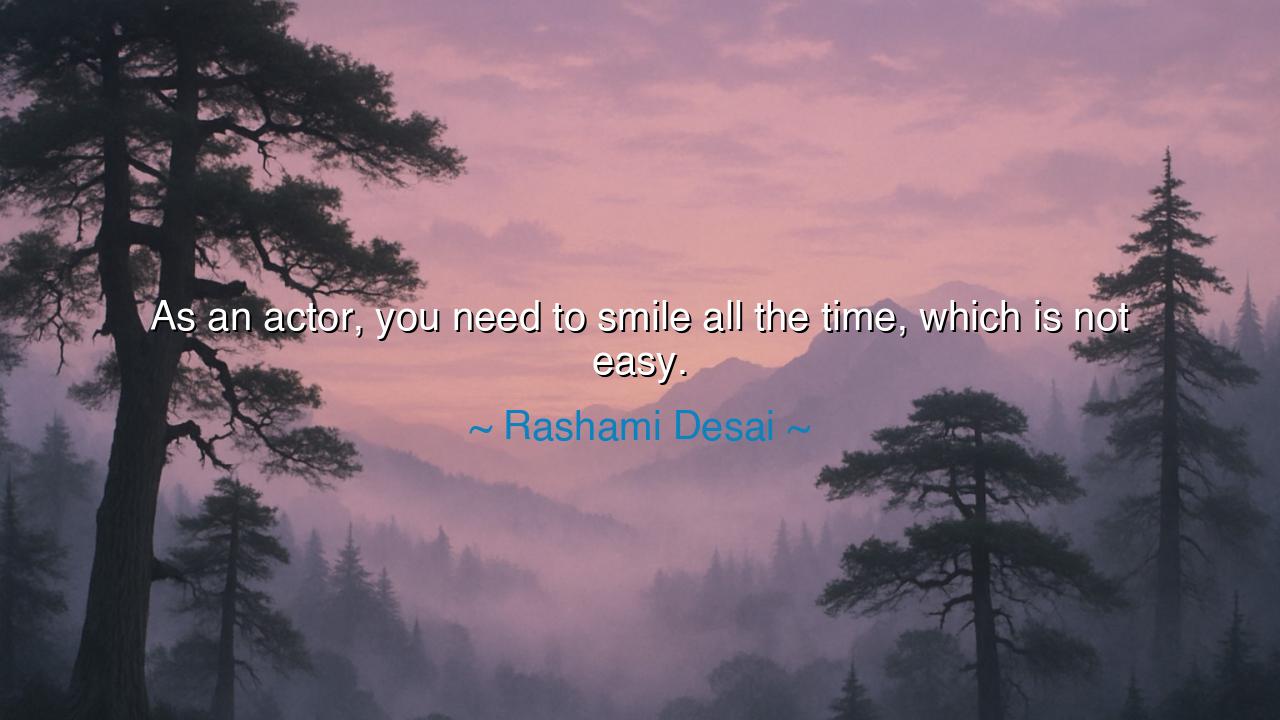
As an actor, you need to smile all the time, which is not easy.






The words of Rashami Desai, “As an actor, you need to smile all the time, which is not easy,” uncover a truth that reaches beyond the stage and into the heart of human existence. To smile all the time may seem effortless from the outside, yet behind the mask of constant joy often lies the weight of sorrow, fatigue, or inner struggle. Her reflection reminds us that what the world demands of us and what the soul carries within are not always the same. To wear a smile unceasingly is an art, a discipline, and at times a burden.
In the ancient world, performers, orators, and rulers knew this well. The Romans had a phrase—persona, meaning mask—for the face one wore before society. The smile was often a part of this mask, signaling warmth, confidence, and approachability. Yet, as Desai reveals, it is not easy to wear such an expression continually, for the mask does not erase the reality of inner storms. Thus, her words capture the eternal tension between the image one shows to the world and the unseen truth of the heart.
Consider the story of Abraham Lincoln. Known for his wit and humor, he often wore a gentle smile even during the blood-soaked years of the Civil War. Yet privately, he carried immense grief, not only for the nation but also for the loss of his young son. To the public, he had to appear steady and even warm; but in his private writings, we see the deep anguish of a man bearing unbearable burdens. In this way, he lived the paradox Desai names: the expectation to smile all the time, even when the soul longs for silence or tears.
This struggle is not only for actors or leaders, but for all who walk in the world. Many are called to wear the smile for their children, for their families, for their communities, though inside they wrestle with pain. And yet, there is strength in this act. To keep smiling, even in hardship, can lift others, giving them hope and courage. The paradox is that what is difficult for the self becomes medicine for those who behold it. Thus, though the task is heavy, it is also noble.
But let us not mistake this teaching. Desai’s words do not command us to deny our pain, nor to silence our sorrow. Rather, they reveal the hidden cost of roles we choose or are given—the weight of maintaining a radiant face before the world. The lesson is not only about endurance, but about compassion: for when we see another smiling, we must remember they, too, may carry unseen burdens. To understand this is to walk with gentleness, kindness, and patience.
The teaching for us is twofold. First, cultivate the strength to smile even when it is not easy, for such a smile can be a light for others in their darkness. But second, learn to honor your own heart, giving yourself space to rest, to grieve, and to heal when needed. Balance the mask and the truth; let the smile you wear not only conceal, but also sometimes reveal the resilience that lies within.
To practice this wisdom, approach others with empathy, knowing that behind every constant smile may be a story untold. When you must wear the mask of joy, do so with dignity, but also tend to your inner self so that the light you give is not forced, but renewed. In this way, you honor both your duty to others and your truth within.
So remember, O seekers of tomorrow: the world may demand that you smile all the time, and though it is not easy, there is power in the act. But true strength lies not only in wearing the smile, but in understanding when to take off the mask and tend to the heart. In this balance, you will find both resilience and authenticity, and your smile will not only be a mask, but a reflection of a soul that endures.






AAdministratorAdministrator
Welcome, honored guests. Please leave a comment, we will respond soon